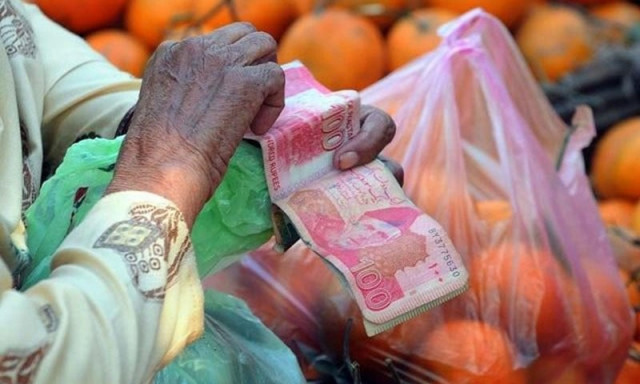Back-breaking inflation pile up misery on the poor
People have been forced to choose between daily essentials and offering a sacrifice this Eid

While traders and consumers may not see eye to eye as far as commodity prices are concerned, they are in unison about their worry about the double-digit inflation that has crippled daily life as they know it.
Even the happiness that Eid brings was dampened with people lamenting about their sudden loss of purchasing power owing to fuel and electricity price hikes which have triggered an unprecedented wave of inflation. One such resident of Johar Town, who identified herself as Shazia, termed the religious festival as “not the same this time around.” Shazia, who had stepped out of the house to get groceries to go with her meat dishes post-Qurbani, said that it was the first time she had to choose between offering a sacrifice or buying new clothes for the entire family.
“I chose the former because that is what this Eid is all about. However, that choice too depleted my savings beyond measure,” Shazia lamented, adding that previously the coronavirus had added to her financial misery and now the double-digit inflation was doing it. Similarly, Adnan, a student who was running Eid related errands for his family, while talking to The Express Tribune, said that his father was distraught that he had not been able to offer a sacrifice this year.
“It was a tough Eid for us. It seems like we have to choose between paying the high electricity bills or eating three times a day. Gone are the days when this used to be a joyous occasion.” With Lahore’s residents forced to make tough choices about what they can spend on, traders are feeling the brunt of the general loss of purchasing power as well. Shehzad Bhatti, a shopkeeper in Anarkali Bazaar, said that in the past the shop used to be full with customers during Eid but this time around there was an eerie silence.
“Furthermore, the government has not given any relief to the business community so it is getting really hard to earn a living,” Bhatti remarked, adding that it looked like if the current situation persists he might be forced to close his doors. Another sole proprietor, Saleem, who owns a store on the renowned MM Alam Road and was forced to cut his Eid holiday short to make an extra income, said that four months prior his shop always used to be full and he had to keep excess stock, however ever since the back-breaking surge in prices of all commodities it was like his customers had “vanished.” Saleem, like Bhatti, feels that he might not be able to sustain huge losses in the long run.
Economist Dr Qais Aslam, was of the view that traders and consumers’ fear of being pushed towards poverty were genuine. When asked how this push could be avoided, the economist suggested that the government had to stop protecting the interests of the rich and give relief to the masses. “Those in power have to protect the common man instead of pushing anti-poor fiscal policies,” Dr Aslam told The Express Tribune.
Published in The Express Tribune, July 14th, 2022.


















COMMENTS
Comments are moderated and generally will be posted if they are on-topic and not abusive.
For more information, please see our Comments FAQ